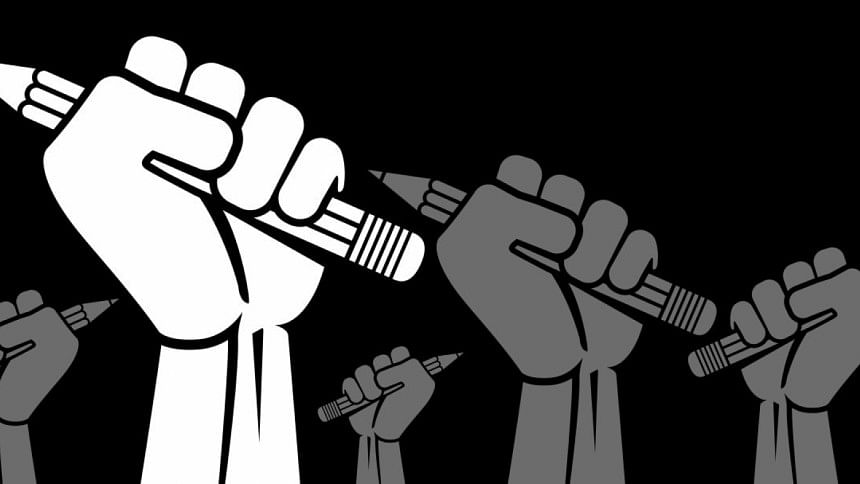'In a democracy, you must learn to tolerate'

The above quote is a strong and clear manifestation of the Indian Supreme Court's endeavour to protect rights of the media as it recently announced that freedom of speech and expression of the media must be allowed to the fullest and the press may not be hauled up for defamation for "some errors" in its reporting.
What does the phrase "some errors" mean? The apex court on January 8 in a defamation case clarified by saying: "There could be some error or enthusiasm in reporting an alleged scam. But, we must allow freedom of speech and expression to press at the fullest. There may be some wrong reporting. For that they need not be hauled up for defamation," according to Times of India.
In response to a petitioner who moved to the court to revive a defamation case against a journalist, the SC bench headed by Chief Justice Dipak Misra made another significant call: "In a democracy, you (petitioner) must learn to tolerate." The apex court also refused to entertain an appeal against a Patna High Court order quashing a defamation complaint against a journalist and a media house. By rejecting the appeal, the Indian apex court unequivocally made it clear that an alleged incorrect news item about a scam does not amount to defamation.
Earlier, in March 2015 the SC of India delivered a big boost to freedom of expression in social media. It declared Section 66A of the Information Technology Act—similar to Section 57 of our ICT Act—unconstitutional and struck it down. This section had been widely misused by police in various states to arrest innocent persons for posting critical comments about social and political issues and political leaders on social networking sites.
According to Times of India, in the verdict the apex court said such a law hit at the root of liberty and freedom of expression, the two cardinal pillars of democracy. The court said the section has to be erased from the law books as it has gone much beyond the reasonable restrictions put by the constitution on freedom of speech.
Over the years the apex court of India delivered many verdicts and orders to protect freedom of speech, expression and press. But its latest order on the defamation issue should be considered as epoch-making. This may be likened to the US Supreme Court's landmark verdict delivered in the New York Times Co. v. Sullivan case around 54 years ago, which upheld the freedom of the press. In its verdict delivered in 1964, the US apex court, for the first time, introduced the "actual malice" standard. This means the court must find evidence of actual malice before it can hold the press guilty for defamation and libel against a public figure. The plaintiff must prove that the publisher was aware that the statement was false and published it anyway. This places a very high burden of proof on the plaintiff in libel cases.
The background of the case against New York Times may be recalled briefly. In 1960, the New York Times ran an advertisement about Martin Luther King. It contained inaccuracies about the conduct of the Montgomery, Alabama police department. The newspaper alleged that the police department took unlawful action against civil rights protesters. Annoyed by the advertisement, the Montgomery Police Commissioner, LB Sullivan, wrote a letter to the New York Times demanding they run a retraction of the story. New York Times refused to do so. Sullivan filed suit against the newspaper. By introducing the "actual malice" standard, the Supreme Court not only held that the New York Times was not guilty of libel, but also opened up many opportunities for news sources to print stories about the civil rights cases in the South.
Now, we may recall the background of the case on which the top court of India on January 8 stepped in to protect the rights of the press. A woman, who mentioned in the petition that she was the daughter of a senior and reputed bureaucrat and that her mother was a minister in the Bihar government, had challenged a judgment of Patna High Court that quashed cognisance taken by a magistrate of her defamation complaint. In the case she had filed with the magistrate court, she accused reputed journalists of telecasting incorrect news defaming her and family members. The news report, aired in April 2010, had alleged irregular allotment of land in Bihiya Industrial Area by Bihar Industrial Area Development Authority to her for establishing a proposed food processing unit. She had alleged that the Hindi TV news channel had made some specific "scandalous and derogatory" comments against her and her parents forcing her to file a defamation complaint, according to the Times of India.
When her counsel challenged the HC decision, a bench headed by Chief Justice Dipak Misra verbally observed: "The case has continued since 2011. The persons have spent a lot of time and money in defending themselves. An alleged incorrect news item about a scam does not amount to defamation."
The SC's order rejecting the appeal has been widely lauded by the press and freethinkers. This will not only contribute to improving the state of freedom of expression and the press but also boost confidence of news outlets which are often hesitant to run investigative reports fearing that they will be dragged into a defamation case.
Investigative reports are always helpful for the government in ensuring the welfare of the people and fighting graft. A free media is never an enemy of such a government. We may therefore take lessons from the above examples set by the Supreme Court of India and the US to protect media from the mindless abuse of defamation laws. Such moves will surely have immense impact on fighting graft and upholding human rights, including the right to freedom of speech and expression.
Shakhawat Liton is special correspondent to The Daily Star.










Comments